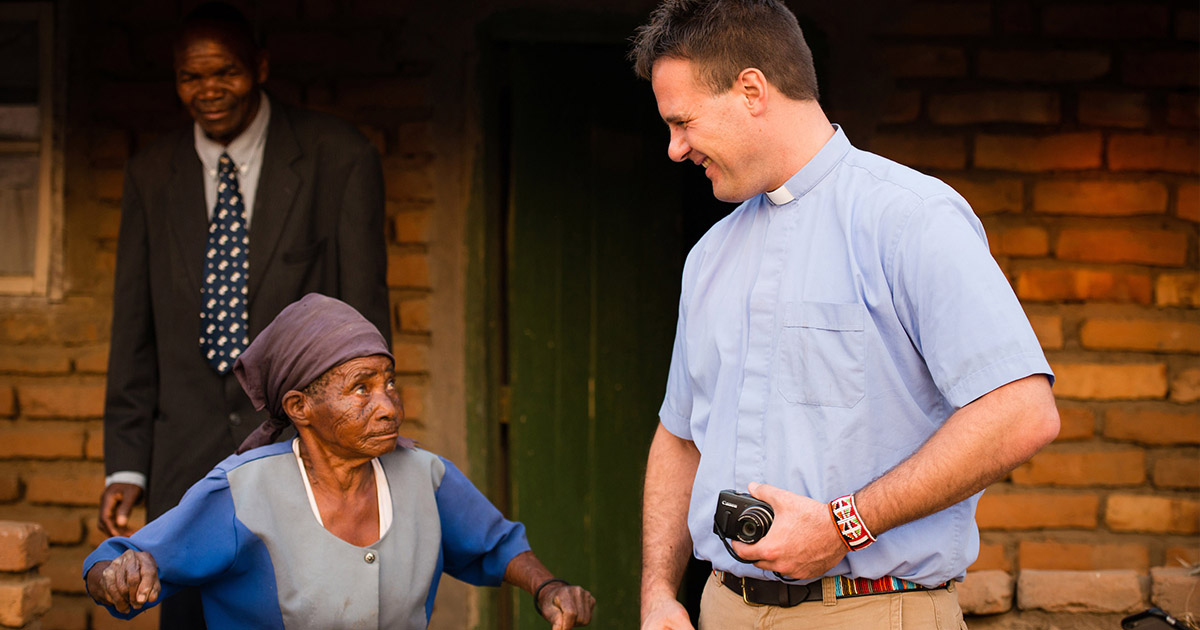
By Stacey Egger
The Lutheran Church—Missouri Synod (LCMS) Board for International Mission (BIM) met Sept. 23 and 24 in St. Louis. The board issued several calls, heard updates from the LCMS Africa region and LCMS Disaster Response, and conducted other business.
Raising up church workers
The Rev. Shauen Trump, director of the LCMS Africa region, updated the BIM about the work of the LCMS in 25 countries in Africa, including missionaries serving in six countries, and about the Synod’s support for 15 confessional Lutheran seminaries across 12 countries.
“You sent us to spread the Gospel, to plant Lutheran churches and to show mercy to God’s people. And we are doing that in Africa,” said Trump.
With 20 million Lutherans in East Africa alone, Trump said that training church workers and planting churches is the Africa region’s highest priority right now. He described the Synod’s blossoming relationship with the Mbulu Diocese in Tanzania and the ongoing work to reach out to the sizable populations living in refugee camps in East Africa. This work includes the training of some young refugee men for the pastoral ministry.
LCMS President Rev. Dr. Matthew C. Harrison highlighted a similar theme in his presentation to the board, discussing the important work of training confessional Lutheran pastors and church workers around the globe.
The new Livonian Lutheran Project, based in Riga, Latvia, is already training future pastors from 12 countries, with 10 students from within Latvia and 27 students from outside, mostly from areas in European countries where confessional Lutheranism has been virtually nonexistent — “the greatest effort at planting churches in Europe that the Missouri Synod has ever undertaken.”
This shift in mission focus is pronounced, said Harrison.
“In the last number of years through the Dominican Republic and our previous work in Argentina, we have produced 18 Spanish-speaking pastors for Central and South America; this fall, we have 40 men studying to be pastors and 140 women training to be deaconesses. And every one of them going through the seminary participates in church planting. This is extraordinary,” Harrison said, “and it’s a bright shining light.”
In his report to the board, LCMS Chief Mission Officer Rev. Kevin Robson highlighted some of the Synod’s national mission work, including efforts to connect with “diaspora” Lutheran immigrant communities in the U.S.
“There are numerous opportunities here to create an awareness of Synod resources that are available to these communities, but also to begin to strategically plan for how we can strengthen our ministry to such ethnic immigrant groups; how we can prepare and form future pastors, deaconesses and teachers to serve in impactful mission and ministry settings; and how we can get pastoral candidates connected to routes to ordination through the strong programs available from our seminaries,” said Robson.
Haiti and beyond
The Rev. Daniel McMiller, executive director of the LCMS Office of International Mission (OIM), updated the board on the OIM’s work, including the publication of a new Spanish-language Lutheran hymnal. McMiller said the distribution and use of the hymnal will be “phenomenally good for the unity of the church in Latin America and in the United States.” McMiller also shared that the Rev. Dr. Mark Rabe has accepted a call to serve as the OIM’s new director of missionary recruitment.
Highlighting the recent earthquake in Haiti, McMiller outlined the local response model under which the OIM and LCMS Disaster Response are seeking to operate. The model provides disaster response training to more LCMS missionaries, who can then manage disaster response efforts in their own regions.
“We feel that that is the best route,” said McMiller. “Just as districts have their own designated response people, we feel it’s best that the missionaries who speak the language, know the local circumstances, know the pastors and congregations, know how to move about, and will be the ones to … live with the consequences … [are] the ones to supervise and manage that response.”
This is important, said McMiller, not just for the efficiency and effectiveness of the response, but also so that the authority and witness of the local missionaries and congregations are not undermined in the eyes of those in their region.
The Rev. Dr. Ross Johnson, director of LCMS Disaster Response, highlighted this same theme in his report to the board on recent disaster response work in Haiti, following the devastating earthquake in August, which killed over 2,200 people and damaged countless properties and homes.
Disaster Response, Johnson said, has worked to particularly bolster and support the work being done by locals, such as clinics that will be run by Haitian doctors and nurses, particularly ones that are done on the grounds of local churches.
“It shows people what Christians really are,” said Johnson. “We show mercy as Christians, and we reflect the light of Christ into a world that is hurting.”
Also at the meeting, Debbie Larson, president of the Lutheran Women’s Missionary League (LWML), described June’s LWML convention in Lexington, Ky., at which a mission fundraising goal of $2.15 million was set, and 28 mission grants were approved for the upcoming biennium to support national and international mission work.
Calls and other board work
The board issued calls to three new LCMS chaplains through LCMS Ministry to the Armed Forces:
- Rev. Karl Gibbs, Chaplain, Active Duty Navy
- Rev. Joshua Schneider, Chaplain, Active Duty Navy
- Rev. Richard Schultz, Chaplain, Active Duty Army
The board also heard a presentation from its subcommittee on 2019 Synod Res. 4-04A and discussed plans for BIM members, along with members of the LCMS Board for National Mission, to meet with the leadership of each of the Synod’s districts ahead of the 2023 Synod convention.
The BIM will hold its next meeting Jan. 27–28, 2022, in St. Louis.
Meeting minutes, when they are finalized, will be posted here.
Posted Oct. 25, 2021




